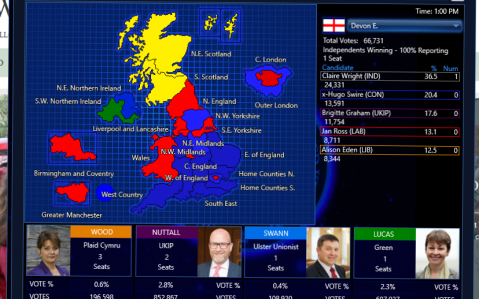How I jez didn’t make it and lost the general election

Photo Rwendland CC BY-SA 4.0 via Wikimedia Commons
I am a huge fan of the election simulation game Prime Minister Infinity and, true to form, publishers 270soft have come out with an update just in time for the snap UK 2017 general election.
Having struggled in the role of Ed Miliband playing 2015 version – though doing better than the real Ed in getting a hung parliament – I again stepped into the shoes of an embattled an Labour leader, this time Jeremy Corbyn.
I tried to play like the real Jez running a generally positive campaign focusing on policies for health and education with an occasional jab at the Tories for being champions of austerity and enemies of public services.
As in real life, however, things didn’t go to plan. A couple of weeks in, the polls had Labour stuck under 30% with predictions of Tory landslide of 400 seats – and the worthy policy speeches of Corbyn-me simply not cutting through in terms of media coverage.
Having started off optimistically venturing into a few Conservative marginals, I quickly found myself like the real world Corbyn retreating to heartlands the north of England and Wales, visiting places like Hartlepool, Hyndburn and Middlesbrough, trying to stop the possible loss of supposedly safe seats to the Tories.
Barnstorming Corbyn…
I soon worked out that I needed to target my advertising better – the game gives Labour a rather generous campaign budget – and to switch Jeremy away from policy speeches no one was listening to on the ground barnstorming: in the right place, just like the real thing, the virtual PMI Corbyn was rather effective (far better than the virtual Miliband) and kept going without running out of energy until the end of the game.
As in real world the wheels came off the Tory campaign towards the end with a series of scandals and bad media stories (the game doesn’t exactly specific about what – expenses, dementia tax?) and I started to put things around. The North and Wales finally swung back to Labour, but my forays across the border to stick it to the Scots Nats (how I tried and tried to win back Glasgow Central as a trophy seat) proved feeble. Central London, however, stayed solidly red without me (or a virtual John McDonald) ever setting foot there.
… but no surge
Try I might, however, I just couldn’t replicate the real world Corbyn surge, we’ve all been watching. Come election night, the national Labour vote on 29% was still down just below where Ed Miliband had left it

My shrewd campaigning in getting the vote in in the right places, did however, fight off the threated Tory landslide. The PM Infinity Theresa May came safely home with ‘only’ 360 seats (42% vote), while I as Labour managed 204. Len McCluskey would be proud of me.
There was no Lib Dem revival – Tim Farron’s party came in with a mere 10 seats. But there were ructions on the political fringes: UKIP, despite a slumping national vote, won Douglas Carswell’s old seat of Clacton and, even more sensationally, displaced Jon Cruddas in Dagenham (I do hope that’s not an omen).
Two independents also got elected – the campaigner Claire Wright taking East Devon off the Tories (a plausible outcome – at least if you believe YouGov) and, less probably, ex-Respect leader Salma Yaqoob saw off Naz Shah in Bradford West.
Political wonk heaven
In terms of game play, the updated PMI allows you to visit and target individual constituencies (not just regions) and produces a set of constituency “results”, which you can export and pore over.
This made for rather slower gameplay on the day-by day version – especially if you’re a political obsessive, the temptation to check how things are shaping up in Blackpool South is awful (here the game is political wonk heaven)– but, for those wanting a speedier campaign, there a version with weekly turns.
As in the previous edition of PMI, British electioneering basically boils down to clever coordination between the “air war” and smart targeting and an eye for local organizational strength in the “ground war. Here, I must admit I’m rather neglected the grassroots in a way the real Jezza probably most certainly wouldn’t/hasn’t: I only focused on-the-ground organization picture as crises blew up and solid seats in the north of England threatened to go Tory.
Other features like endorsement, crucial for the US version of the game President Infinity (at least until Trump), loom less large in PMI. Anyone playing Labour should, however, probably pay more attention I did to avoid the embarrassment of the Guardian and the Mirror backing the Lib Dems.
Trackbacks / Pingbacks